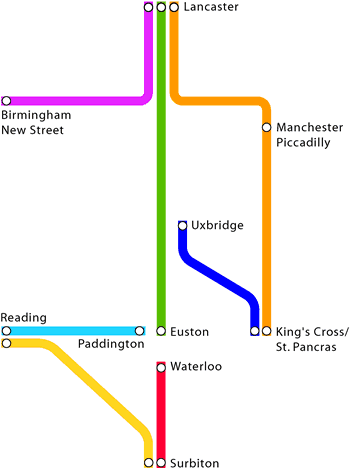
a map of the journeys you may have made |
on arrival...This particular project is concerned with 'travel time use' - both an exploration of the practices involved in travel, and their discussion within the transport industry and literatures. Some implications from this initial ethnography for the project include: 1... An approach to travel as a practice, rather than product or consumable, seems helpful and insightful. Travellers are not (or not solely) passengers, customers or statistics passing through, and counting them in this way has effects. That is not to say that numbers do not have a role in the transport industry, but that they partly create the experience of travel; the timetable system necessarily imagines travellers and trains in a rather limited way, which has implications when travellers are delayed and fall outside that system. The ways in which travel and travellers are constructed by the different technologies, people and places in public and private transports, needs to be better understood, and will be part of the continuation of this project. A method which includes recording ways in which different systems, industries and technologies represent (or rather 'make present' or 'make absent') aspects of travellers and passengers will be attempted. 2... If travel is a practice, if it takes effort, then there is element of craft and expertise to travel and making journeys. Exploring stories of effective, enjoyable as well as frustrating journeys, might help to understand the differences/gaps between well-crafted and ill-crafted journeys. 3... The experience of a travel ethnography was methodologically distinctive. The ethnographer of travel is inseparable from the act of travelling, they are always interpellated into the field (blurring any subject/object distinction). Therefore an autobiographical approach, which includes a travel diary by the ethnographer as well as more traditional fieldnotes, seems appropriate. Given the approach to travel as a practice, using video and photographic methods to record practices, bodies, technologies and experiences also seems important. Alongside this heterogenous fieldwork, shadowing select travellers in a more in-depth manner, will provide further important details on particular travel practices. Overall, it is hoped that these approaches and methods will establish different frameworks for debates on travel and travel time use, and, ultimately, will feed back into specific transport industry concerns. end your journey |